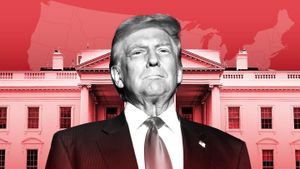SoftBank Group, led by Masayoshi Son, is reportedly negotiating to spearhead a highly anticipated funding round for OpenAI, the maker of ChatGPT, with projections of raising up to $40 billion. This significant financial injection could push OpenAI’s valuation to approximately $300 billion, reflecting its rapid ascent and the competitive nature of the AI sphere, especially following the emergence of the new Chinese AI startup, DeepSeek, which has recently overtaken ChatGPT as the foremost free app on U.S. app stores.
According to reports from Reuters, SoftBank's interest signals both confidence and strategic foresight, as competition intensifies within the AI sector. Just months ago, OpenAI's valuation was estimated at $150 billion, only to leap to $260 billion amid discussions of this funding round. This dramatic shift highlights the furious pace of investment and the shifting dynamics of market valuations, particularly as DeepSeek's cost-effective AI models capture attention.
The forthcoming investment would likely involve convertible notes, akin to OpenAI's prior funding arrangements, and hinges upon the startup restructuring its existing organizational framework to lessen the control exerted by its non-profit arm. This kind of restructuring has become increasingly pertinent, as stakeholders and investors dissect the operations of tech companies prioritizing profitability.
Notably, within the proposed $40 billion package, funding earmarked for the Stargate project—a collaboration among OpenAI, SoftBank, and Oracle—could be between $15 billion and $25 billion. This ambitious venture aims to consolidate investments of up to $500 billion to bolster the U.S. position against its rivals, primarily China, within the AI arena. Reports from The Wall Street Journal also hinted at SoftBank leading the funding round at even higher valuations, potentially reaching $340 billion.
This surge of interest follows mounting scrutiny on financial strategies employed by U.S. AI enterprises as DeepSeek recently claimed it only required $5.6 million to train its V3 language model on older Nvidia H800 processors. This starkly contrasts with commitments from giants like Microsoft and Meta, who disclosed expenditures of $80 billion and $65 billion, respectively, on AI infrastructure this year. During Microsoft’s recent earnings call, CEO Satya Nadella and Meta's Mark Zuckerberg defended this massive investment, asserting its necessity for maintaining competitiveness.
OpenAI's broader financial outlook reflects notable challenges; after raising $6.6 billion from investors—including Microsoft and NVIDIA—to steer clear of bankruptcy, the company faces projections of incurring losses nearing $5 billion within the next year. Market analysts suggest there is both urgency and pressure for OpenAI to transition effectively from its current model to become more profit-oriented, particularly with critics raising concerns over its mission alignment.
Elon Musk, former co-founder of OpenAI and current Tesla CEO, has been vocal about his grievances, having filed lawsuits against the firm’s CEO Sam Altman, citing deviations from its foundational goals and raising allegations of racketeering. Musk claims he was misled about the organization’s charitable intentions. With these pressures mounting, experts speculate whether OpenAI can fend off outside interference or hostile takeovers if it fails to realize profitability within the forthcoming two-year framework, as investor patience dwindles.
Interestingly, market commentators predict real risk for OpenAI, pointing toward the possibility of Microsoft seizing ownership should it falter to meet the burgeoning expectations of investors. Many speculate the ChatGPT developer could experience staggering losses, potentially amounting to $44 billion, before it reaches any profitability target, anticipated no earlier than 2029. These losses are largely attributed to the exorbitant costs surrounding the training and deployment of advanced AI models, salaries, operating expenses, and its partnership with Microsoft, which purportedly claims 20% of OpenAI's revenue.
Despite the plethora of challenges, OpenAI is currently enjoying its frontrunner status, having established itself as the de facto leader within the AI community. Yet, the burgeoning interest from investors, particularly entrenched institutions like SoftBank, signals both opportunity and turbulence as the AI contest intensifies globally. Analysts continue to ponder how such financial maneuvers may reshape the foundational tenets of innovation within this sector, especially as the balance between profitability and visionary goals teeters on the razor's edge.



